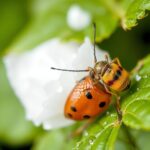What Do Aphids Hate the Most in the Garden? Effective Tips to Keep Them Away!

Aphids are notorious garden pests that can wreak havoc on plants by sucking their vital juices. These tiny insects not only damage foliage but also spread diseases, making it essential for gardeners to take proactive measures. Understanding what aphids despise can be a game-changer in your gardening strategy. In this article, we will explore effective tips and natural deterrents that can help keep aphids at bay. From aromatic herbs to beneficial insects, discover practical solutions that will help you maintain a healthy, thriving garden free from these unwanted visitors. Say goodbye to aphids and hello to flourishing plants!
What Repels Aphids Most Effectively in the Garden?
Aphids are persistent pests that can wreak havoc on garden plants, but they have certain natural repellents that can deter their presence. Among the most effective are strong-smelling plants such as garlic and chives, which produce a fragrance that aphids find unappealing. Additionally, the use of homemade sprays made from diluted dish soap or neem oil can disrupt their feeding and reproductive cycles, effectively reducing their populations. Certain insect predators, like ladybugs and lacewings, also help keep aphid numbers in check, showcasing that a balanced ecosystem is essential for managing these pests. By incorporating these strategies, gardeners can minimize aphid infestations and promote a healthier growing environment.
The Role of Strong-Smelling Plants
Strong-smelling plants play a crucial role in deterring aphids from invading your garden. Garlic, chives, and mint are examples of plants that emit powerful odors, making the environment hostile for aphids. Planting these varieties strategically around your susceptible crops can create a natural barrier that significantly reduces aphid attraction, thus promoting healthier plants and minimizing pest issues.
Homemade Aphid Repellent Sprays
Creating homemade sprays is an effective way to combat aphid infestations without resorting to harsh chemicals. A simple mixture of diluted dish soap or neem oil can suffocate aphids when sprayed directly onto affected plants. These solutions disrupt their feeding and reproductive processes, helping to control their numbers naturally. Regular application is recommended, especially after rainfall, to maintain effectiveness and ensure your plants remain aphid-free.
Importance of Beneficial Insects
Encouraging beneficial insects in your garden is vital for natural aphid control. Ladybugs, lacewings, and hoverflies are all excellent predators of aphids, helping to maintain a balanced ecosystem. By planting nectar-rich flowers that attract these helpful insects, gardeners can foster a healthy environment where beneficial species thrive, ultimately reducing aphid populations without chemical intervention.
See also:
Companion Planting Strategies
Companion planting involves growing different plants in proximity for mutual benefit, and it can be a highly effective strategy against aphids. For example, pairing roses with garlic or tomatoes with basil can deter aphids, as these combinations create a less inviting atmosphere for these pests. The synergistic effects of companion plants not only improve growth but also enhance pest resistance, providing a holistic approach to gardening.
Regular Monitoring and Maintenance
Regular monitoring and maintenance are essential components of keeping aphid populations in check. By frequently inspecting plants for early signs of aphid activity, gardeners can take prompt action to manage infestations before they escalate. Implementing practices such as pruning, maintaining plant health, and using sticky traps can all contribute to effective aphid management, ensuring the garden remains vibrant and productive.
| Methods | Effectiveness | Application |
|---|---|---|
| Strong-Smelling Plants | High | Plant nearby at intervals |
| Homemade Sprays | Medium | Apply weekly or after rain |
| Beneficial Insects | Very High | Encourage with flowers |
| Companion Planting | High | Grow plant pairs together |
| Regular Monitoring | Critical | Check plants bi-weekly |
Understanding Aphid Repellents: Natural and Organic Solutions
To effectively deter aphids in your garden, it’s essential to understand which scents, plants, and natural materials they dislike most. Aphids are particularly sensitive to strong smells, making substances such as garlic, neem oil, and certain essential oils powerful tools in the battle against these pests. Incorporating companion plants like marigolds or basil can create an environment that is not conducive to aphid infestation. Additionally, using a combination of beneficial insects, such as ladybugs and lacewings, can provide a natural balance that helps reduce aphid populations. Regular garden maintenance and monitoring for early signs of infestation will also ensure that your garden remains healthy and aphid-free.
Utilizing Strong Scents to Deter Aphids
Aphids are known to be repelled by certain strong scents that are often emitted by herbs and essential oils. Plants like peppermint, rosemary, and lavender can serve as natural deterrents when planted strategically in your garden. Creating a spray using these herbs infused in water can also enhance your defense against aphid invasions. Regular application of these scents will create an unwelcoming environment for aphids, encouraging them to seek shelter elsewhere.
Companion Planting as a Natural Deterrent
Companion planting involves placing specific plants together to enhance growth and provide pest control; in the case of aphids, developing a network of strong-scented herbs and flowering plants can significantly reduce their appeal. For instance, combining growing radishes with squash not only optimizes space but can lure aphids away from your desired plants. The combination of flowers like marigolds can attract beneficial insects, which will help keep aphid numbers in check.
See also:
The Role of Beneficial Insects in Aphid Management
Introducing beneficial insects into your garden ecosystem can be a highly effective way to manage aphid populations. Ladybugs and lacewings are particularly renowned for their voracious appetite for aphids, consuming hundreds in a single day. By creating a welcoming habitat for these insects, including foliage for shelter and alternative food sources, you can cultivate a naturally balanced ecosystem that controls aphid outbreaks without the need for chemicals.
Using Neem Oil and Other Natural Remedies
Neem oil is an effective natural remedy that disrupts the life cycle of aphids when sprayed onto affected plants. It works by affecting their ability to reproduce and feed, leading to their decline in numbers. Additionally, employing other oils and homemade sprays made from garlic or dish soap can create a hostile environment for aphids. Proper application involves ensuring thorough coverage on all plant parts, making it crucial to reapply after rainfall.
Regular Maintenance and Monitoring of Plants
Keeping a close eye on your plants through regular maintenance is pivotal in preventing aphid infestations. Inspecting for signs of aphids early allows for quick intervention, ensuring that larger populations do not establish themselves. Pruning affected areas and ensuring plants are healthy and well-nourished can also increase resilience against pests. By maintaining cleanliness and removing debris, you can eliminate potential hiding spots for aphids, further protecting your garden.
Questions from Our Readers
What plants are most effective in deterring aphids?
To deter aphids, plants such as marigolds, chives, and garlic are particularly effective. These plants release compounds that are unpleasant to aphids and can help reduce their presence in the garden by acting as a natural repellent.
What natural substances can be used to repel aphids?
Natural substances like neem oil, insecticidal soap, and peppermint oil can effectively repel aphids from your garden. These products disrupt the aphids' ability to feed and reproduce, thereby helping to manage their populations without harming beneficial insects.
See also:
How does companion planting help in controlling aphids?
Companion planting involves growing specific plants together to naturally deter pests. By planting companion plants that aphids dislike near susceptible crops, such as basil with tomatoes, gardeners can create an environment that is less inviting for aphids while promoting healthier plant growth.
Are there any beneficial insects that help control aphid populations?
Yes, beneficial insects like ladybugs, lacewings, and parasitic wasps are effective natural predators of aphids. By attracting these helpful insects to your garden, you can effectively reduce aphid populations as they will prey on them, enhancing the biodiversity and health of your garden ecosystem.

If you want to read more articles like What Do Aphids Hate the Most in the Garden? Effective Tips to Keep Them Away!, we recommend you check out our Insects category.
Leave a Reply
Related Articles